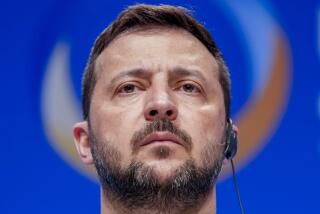Buoyant Bush, Still Basking in Warmth of East Europe Reception, Returns Home
WASHINGTON — President Bush returned home from Europe on Tuesday, still a little euphoric after a week that began with cheering crowds in Poland and ended with a letter from Soviet President Mikhail S. Gorbachev proclaiming the Kremlin’s desire to move closer to the West.
“We all come away with real genuine feelings of genuine change,” he told reporters aboard Air Force One. “I think the American people need to know how strongly we feel about this.”
And in private, aides said, the President has been marveling at Gorbachev’s willingness to seek openings toward the West.
“We move, he moves; we move, he moves,” the President said admiringly after reading Gorbachev’s letter, according to an aide.
But welcoming Gorbachev’s expressions of good will is one thing; devising a way to help the Soviet Union actually transform its political system is another. And on that next step, officials say, the Bush Administration is still uncertain how--and how fast--to move.
“We need to respond to Gorbachev to help keep this process going,” said one aide who accompanied the President on his trip. “But things have been moving so fast we sometimes have a hard time just keeping up.”
Some officials have proposed, for example, that the United States should respond to Gorbachev’s letter with a list of standards the Soviet Union should meet if it really wants to take part in the international economic system--standards like more private enterprise, a convertible currency and an end to government-fixed prices.
“Gorbachev says he wants to join the world economic system; we ought to be giving him some conditions that he can meet,” one senior official said. “If we don’t, we’re missing an opportunity.”
A few officials think the United States should actively consider offering the Soviet Union some of the same kinds of assistance Bush announced last week for Hungary and Poland: financial, trade and technical measures to help nurture the Communist countries’ experiments with free enterprise. Such assistance would be modest at best, but it might offer the Soviet leadership additional incentives for moving toward the West.
But so far, officials said, the Administration is being cautious and, if anything, is slowing the pace a bit. When Bush was asked at the economic summit in Paris if he planned to respond to Gorbachev’s letter, for example, he said he’d leave that to French President Francois Mitterrand, to whom the message was formally addressed.
And when National Security Adviser Brent Scowcroft was asked whether it was time to offer the Soviet Union the same kind of economic aid as Poland and Hungary, he responded that any such talk was premature.
In his letter, delivered to Mitterrand on Saturday as a message to the summit, Gorbachev said he wants to move the Soviet Union toward “full and complete participation in the world economy.”
“The rest of the world can only gain from an opening toward the world economy of a market like that of the U.S.S.R.,” he wrote.
But beyond those sweeping pronouncements--plus a plea for international cooperation to reduce Third World debt--Gorbachev’s message was largely vague. It made no promises about the evolution of the economic system inside the Soviet Union--indeed, it noted that while communism is borrowing “management tools” from the West, “each system retains its own characteristics.”
In fact, while Gorbachev’s commitment to changing his economic system is clear, in practice it lags far behind the experiments in private enterprise already under way in Hungary and Poland.
Moving Slowly
So, for the time being, Bush is taking Scowcroft’s advice and moving relatively slowly. On his trip through Poland and Hungary, his main preoccupation seemed to be reassuring Gorbachev that his embrace of Communist reformers in Warsaw and Budapest is not aimed against the Soviet Union.
But with so much progress in the air, Administration officials are talking with more confidence than before about an initial summit between Bush and Gorbachev by early next year. White House Chief of Staff John H. Sununu indicated in an interview that the meeting would probably occur either this December or in January, 1990.
The main effect of the trip, Bush and his aides all said, may have been the impressions they came away with--”images we won’t forget,” as Bush said.
The President mentioned the crowds waving American flags at his stops in Eastern Europe and the presentation by Hungary’s reformist leaders of a plaque bearing a barbed-wire length of the old Iron Curtain border fence, which they tore down earlier this year.
But most impressive, Bush said, was his reception in Poland’s seaport of Gdansk, the birthplace of the independent labor union Solidarity, now the opposition political movement.
In the city’s Solidarity Square, more than 20,000 Poles cheered lustily for Bush, Communist officials lined up to pump his hand and Solidarity workers were visibly in control of the entire city.
“I think this is what Karl Marx had in mind,” quipped National Security Council aide Condoleezza Rice as she looked at the crowd. “It just didn’t turn out the way he expected.”
More to Read
Sign up for Essential California
The most important California stories and recommendations in your inbox every morning.
You may occasionally receive promotional content from the Los Angeles Times.











